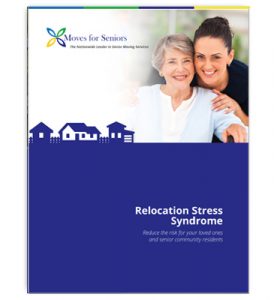Managing an Emergency Move for a Senior Loved One
 Moving is difficult for all of us- whether young or old. There are many articles that provide information and advice on what to do leading up to your move to make it easier…. but what about when the move is unplanned and urgent? The focus of this blog is the special considerations related to moving a loved one into senior housing with little or no warning. This is usually caused by a fall, a medical condition such as a stroke, or other medical complication that has a sudden onset. We will share some tips that bring at least a bit of structure to a chaotic time and touch on the mental health impact of these situations.
Moving is difficult for all of us- whether young or old. There are many articles that provide information and advice on what to do leading up to your move to make it easier…. but what about when the move is unplanned and urgent? The focus of this blog is the special considerations related to moving a loved one into senior housing with little or no warning. This is usually caused by a fall, a medical condition such as a stroke, or other medical complication that has a sudden onset. We will share some tips that bring at least a bit of structure to a chaotic time and touch on the mental health impact of these situations.
So, you – the adult child, family member or friend – get the call from a medical professional that your loved one will no longer be able to live at home and will need a high level of care. Now what?
Tips to Get Started – triage the situation. What decisions need to be made immediately? Deal with them first. Anything that can be put off should be. Minimizing stress is critical for the wellbeing of you and your loved one.
- Understand your options. The senior’s medical professionals may provide you with a list of Assisted Living or other communities that are appropriate for the situation. Talk to the social and/or case worker to get more insight and additional lists of resources for other services that you might need to set up. You can also check with your local Senior Services Agency or national services such as A Place for Mom and Caring.com.
- Lean on the experts and do your due diligence. When speaking with the Sales Leader or Executive Director of a senior housing community, don’t hesitate to ask them for guidance. They want new residents to have a smooth transition and can share best practices. Ask about all the services they do and do not provide on-site. Consider: location, range of care options, social activities/events, any current friends or family members living there.
- Get the senior involved. Once you have 1-3 strong options for the new home, be sure to make your loved one a key part of the decision-making process (if they are capable) and get them excited. Having a say in a decision that will be so impactful to their day-to-day life is hugely important – it’s their life, their future, and their happiness at stake. While this will probably be a very difficult change for them, there are plenty of upsides to Community living – easy access to help when needed, prepared meals (in some locations), social events and activities, new friends (and old, if they are lucky), outings and excursions, and more.
- Get as much paperwork together as possible. This will ease the medical transition from one set of caregivers to the next. If your senior is currently in a medical facility or rehab, ask for all the records they have related to the recent health issue (including from other facilities). They should also have a current list of all medications and the dosage. This is very important and can be difficult to piece together on your own – make copies of all the documents and be sure to keep a version for yourself!
- Make the Move. This part is mostly logistics-focused and can have lots of moving parts.
- More often than not, the discharging medical facility will be arranging medical transport for your senior- but check to be sure.
- Ask the Community if the new accommodation includes furniture like a bed, nightstand(s), a small bureau, and chairs or a small couch for visitors. If they do, that’s great. If not, these are the essential items to get to the room ASAP- preferably before your senior arrives at the community. If you need to move items from their home, contact a mover that specializes in senior moves and is familiar with the move-in requirements of senior facilities, like Moves for Seniors.
- Pack a suitcase with your loved one’s toiletries, comfortable clothes for one week, medications, and a wallet with some petty cash and 1 credit card.
- If possible, move in some of the senior’s favorite accessories that will make the new home feel familiar – favorite family photos or artwork, a favorite quilt or blanket, etc.
- Take a breath… it’s been a lot on your shoulders already! Then get ready for a few more things that you can worry about now that the urgent move has been completed and your loved one is settled.
- Financial Planning. After move-in, it’s important to take stock of your loved one’s financial picture. If the senior has savings to cover everything, then this might be pretty simple. If not, there are a number of considerations for funding sources for long term care and housing. Interviewing Certified Financial Counselors who specialize in senior housing funding and other estate management issues can be very helpful in making the right decisions.
- Downsizing and House Cleanout. If your senior’s previous home is now unoccupied, you’ll need to get it cleaned out and ready for its next phase. There are resources available in your community to help with sorting, decisions about what to keep vs. donate vs. sell (possibly through an online auction), what to ship to more distant loved ones, and ultimately prepare the home for whatever’s next. A company like Moves for Seniors can help with donation, home cleanout, and decluttering services which can take a lot of the stress out of the process – especially useful if you don’t live locally.
Mental Health Considerations
 For the senior: Being suddenly told you can no longer return to your home is traumatic. Many seniors have lived in their home for many years and have countless memories and prized possessions. Relocation Stress Syndrome (RSS), also known as transfer trauma, is a formal nursing diagnosis defined as “the combination of medical and psychological reactions to abrupt physical transfer that may increase the risk of grave illness or death.” Click here to read more about RSS, signs to look for, and ways to avoid it. The more input the senior is able to have into decisions, the better. Listen to them, make them part of the conversation, explain things clearly, and don’t minimize their feelings and concerns.
For the senior: Being suddenly told you can no longer return to your home is traumatic. Many seniors have lived in their home for many years and have countless memories and prized possessions. Relocation Stress Syndrome (RSS), also known as transfer trauma, is a formal nursing diagnosis defined as “the combination of medical and psychological reactions to abrupt physical transfer that may increase the risk of grave illness or death.” Click here to read more about RSS, signs to look for, and ways to avoid it. The more input the senior is able to have into decisions, the better. Listen to them, make them part of the conversation, explain things clearly, and don’t minimize their feelings and concerns.
For you: At the end of the day, orchestrating an urgent move for your loved one can be exhausting. Many times, it’s an added layer of stress on top of taking care of kids, working full time, and all the other things you have going on. Make sure that your emotional wellbeing is as much of a priority as the move. Take breaks, share the workload across siblings or other family members, and communicate how you are doing. Don’t sweat the small stuff – just get the most important things done and wait on the things that can wait. Hire emergency help for the elderly and rely on experts; there are many people out there who make their living by managing exactly these types of situations.